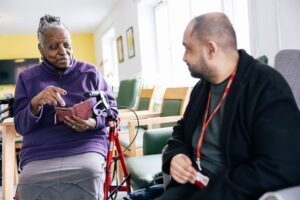New study commissioned by TEC Action Alliance reveals what those in social care, their families and carers most value in tech – but don’t always get.
Technology-enabled care (TEC) is an increasingly important factor in social care provision but there’s an ongoing concern that TEC services and solutions should not be imposed on people in care, their carers and families. Instead, TEC should be developed with the voices and needs of these users as a central consideration.

Photo via TEC Action Alliance
That’s the aim of the TEC Action Alliance, a body comprised of some 30 care organisations including Care England, Homecare Association the Local Government Association and the TEC Services Association (TSA). One issue has been that previous studies of the role of tech tend to focus on the views of care staff and care organisations instead of the people who draw on care and support.
That’s why the alliance commissioned social policy researcher Dr Sarah Alden to research the different ways that users, families and unpaid carers use technology to support themselves. To do so, Dr Alden conducted almost 50 interviews and focus groups, and examined more than 100 sources of evidence, before producing her report, ‘Implementing TEC so we can all live gloriously ordinary lives.’
The study concludes that what people most want from TEC can be summarised in nine categories:
- Awareness: To know more about the ways in which technology can meet their needs
- Independence: Devices and systems that support them to do more for themselves
- Control: To maintain control over care technology, wherever possible
- Reassurance: Peace of mind for themselves and their families through connected technology
- Seamlessness: Tech that is joined-up and compatible with familiar devices
- Personalisation: Tech to be tailored to their needs and offer them genuine choice
- Equal decision-making: A say in the design and functionality of their care technology
- Support: Help, advice and training if they struggle to access or adopt technology
- Privacy and security: Reassurance around online safety and autonomy over their data
Given this, the TEC Action Alliance now calls on all local authority social care commissioners and housing providers to embed these nine principles in the way they procure TEC contracts. Indeed, suppliers bidding for contracts should how they will meet them.
In addition, the report underlines the need for a common language to describe all the different types of TEC available. At the moment, different terms – often involving very technical phrases – are uses by different commissioners, service providers and suppliers. The report says that standardised, easy-to-understand terms and definitions would help more people, families and health and social care professionals to understand what’s involved and find suitable digital care.
TEC services are not only suitable for those with high-level needs. Indeed, the report highlights a missed opportunity in using TEC to support those with low-level needs to help themselves. It recommends raising awareness of TEC within NHS primary care and community services so that GPs, pharmacists and physios can signpost people to such services early on, enabling them to self-manage their own health and delay the need for more intensive care and support.
It’s also important that people can be sure the TEC they use is reliable and safe. The TEC Action Alliance calls for wider use of quality assurance schemes and recommends a standardised TEC evaluation framework, enabling the sector to build up a consistent body of evidence about the benefits of such tech.
Alyson Scurfield, CEO of TEC Services Association (TSA) and Co-Chair of the TEC Action Alliance, says: ‘Over 2m people in the UK already use technology-enabled care but there is an opportunity to support many more people to live happily and independently at home. We’ll never realise this potential if we don’t ask people what they want from digital care, and then design services and solutions around these ambitions – rather than assuming we know what they want.’
Clenton Farquharson CBE, Chair of Think Local Act Personal (TLAP) and Co-Chair of the TEC Action Alliance, adds: ‘Organisations providing TEC services or manufacturing devices must re-focus on people, their families and unpaid carers. This means co-producing TEC so it’s shaped by individuals. It also means ensuring TEC is easy to use and seamless, providing support so people feel confident using it. Those basic principles must be followed, right across the sector, so people can live technology-enabled lives.’
In related news:
Money is no object, or at least it is for the ‘silent generation’
Richmond Council named as the best for supporting adults in social care












